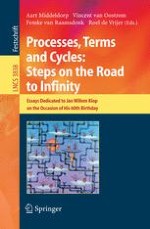2005 | Buch
Processes, Terms and Cycles: Steps on the Road to Infinity
Essays Dedicated to Jan Willem Klop on the Occasion of His 60th Birthday
herausgegeben von: Aart Middeldorp, Vincent van Oostrom, Femke van Raamsdonk, Roel de Vrijer
Verlag: Springer Berlin Heidelberg
Buchreihe : Lecture Notes in Computer Science
